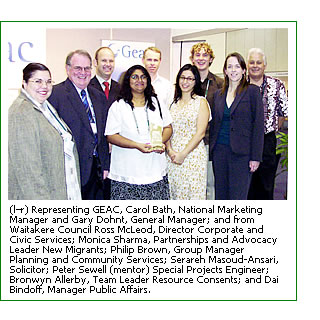In May, Local Government Managers Australia (LGMA) staged its 2006 National Congress in Perth. Some 440 managers and elected members from Councils across Australia heard from a range of presenters who addressed three key themes – strategic directions, community outcomes and organisational development.
In welcoming delegates, then LGMA National President, Noelene Duff, said that LGMA’s recent national skills summit in Canberra demonstrates that it is responding to the needs of Local Government with the skills shortage being a major issue.
Federal Minister for Local Government, Jim Lloyd, speaking to delegates via video, congratulated LGMA on taking the lead in initiating this summit.
“With informed debate and the opportunity to share ideas, it was a great success,” the Minister said. “But there is no easy, quick fix solutions to this nationwide problem.”
Keynote speaker, Martin Horton, from the UK’s Improvement and Development Agency (I&DeA) spoke about the importance of Councils sharing knowledge and spreading good practices across the sector.
“In this room is a wealth of good practice,” he said. “But how well are you sharing this knowledge? None of us are that unique that we cannot learn from someone else, and we should be proud of our ability to copy. Our sector has developed it, so we should all be making the most of new processes or initiatives.”
Martin Horton said that in the UK over the past 15 years, Central Government has imposed massive change on Councils, and Local Government has reacted very efficiently to implementing these new requirements.
“But UK Councils have in the process forgotten how to lead our own change because we have been spending too much time responding to Central Government change,” he said. “As a result, we have not been looking at how well we are responding to our communities and where our communities want to be. We need to learn to lead again at the community level.”
He believes that Local Government does not talk enough about real people and real places.
“When Local Government screws up, we can screw up people’s lives,” he said. “Local Government is engaged in valuable work, and if we can’t get passionate about this, then what can we? We are not running services for professional interests or the interests of our organisations. Services must be directed to the needs of the people who use our services. Look at your services from the perspective of the people who rely on that service.”
Martin Horton said that if local democracy is important we should also be investing heavily in those people we elect under democratic principles.
“For this reason we should pay Councillors to act as advisers for other Councils,” he said. “Acting as mentors or coaches, Local Government should put teams together to go into Councils to review operations and suggest improvements. Today’s good quality Council was probably not long ago a basket case. Similarly, good Councils can unravel very quickly.”
Martin Horton believes that sustainable improvement has to come from within organisations and not be forced from outside, such as via legislative proscription. “We must recognise within ourselves the need to make a change,” he said. “It is a journey and it will take time.”
At the conclusion of the Congress, Bruce Davidson, Chief Executive Officer at Noosa Council commenced his term as LGMA National President.
Waitakere takes out 2006 Management Challenge
This year 130 teams from across Australia and New Zealand competed in the Australasian Management Challenge. Sponsored by GEAC, the finalists, who had previously won their State and New Zealand events, competed for the Australasian title in a full day event in the lead up to LGMA’s National Congress in Perth.
Waitakere representing New Zealand was this year’s winner with Glemorgan/Springbay (Tas) and Fremantle (WA) coming second and third. Other finalists were Thuringowa (Qld), Marrickville (NSW), Macedon Ranges (Vic) and Burnside (SA).
Captain of the Waitakere team, Phillip Brown, said that his team was delighted to accept the trophy given the calibre of the other teams.
“It has been a privilege to be involved,” he said. “We have learned a lot about ourselves and the value of working as a team.”
Once again various members from the competing teams had nothing but praise for this very successful learning and development program. Faced with a range of tasks, the teams were required to set priorities and delegate tasks. Making presentations, undertaking negotiations and carrying out analyses were just some of the skills they honed. Thinking strategically rather than being task orientated, learning by doing, not panicking, gaining confidence in their own ability and building trust within the team, were just some of the things competitors said they will be able to take back and apply in their own jobs. As one participant explained, she was told the experience would change her life and it did.

















